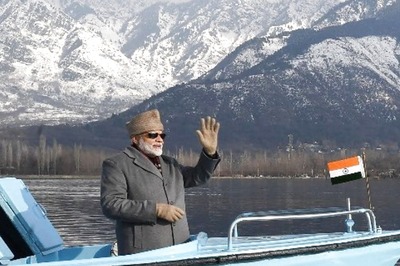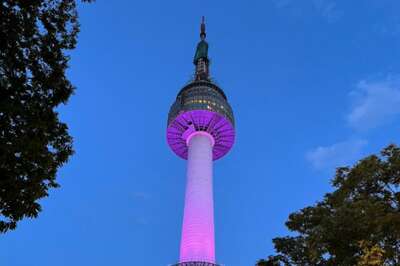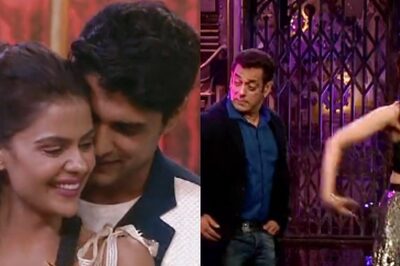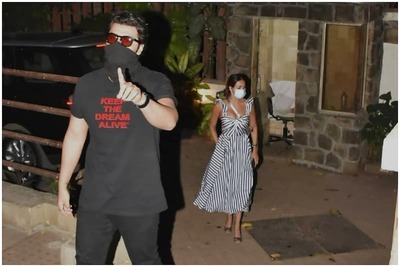
views
The Rajya Sabha elections for the four seats of Gujarat almost became a nail-biter just like the November 2017 elections in which senior Congress leader Ahmed Patel was fighting for this fifth consecutive term in the upper House of Parliament.
However, while the circumstances were quite similar, the Congress could not replicate the same magic this time. Three of the four seats, which a few days ago could have been shared equally by the two parties given their strength in the Assembly, finally went to the BJP.
Abhay Bharadwaj, Ramila Bara and Narhari Amin of the BJP won, while Shaktisinh Gohil secured the sole victory from the Congress camp.
In the run up to the re-election bid of Patel also, a high-pitched drama was seen, in which the grand old party lost 15 of its MLAs, or one-fourth of its party strength in defections.
This time too, the party saw its tally reduced from 77 to 65 in the months leading up to the elections. The party had to, in a desperate bid, divide its remaining MLAs in four different groups and shift them to a plush hotel to prevent more of them from quitting, just as it had done in 2017.
And had happened in 2017, when two crucial votes of Congress MLAs who had indulged in cross-voting were rejected by the Election Commission, this time, the Congress tried to seek victory by getting a couple of votes disqualified.
The party urged the Election Commission to cancel two BJP MLAs' votes. First of Bhupendrasinh Chudasama, whose vote could not be counted, the Congress argued, since his membership to the Assembly was quashed by the Gujarat High Court.
It also sought to quash the vote of Kesarisinh, who they argued had cast his vote through a proxy voter. Both these objections were overruled by the EC.
The drama over the Rajya Sabha elections in Guajrat had started way back in March, when the BJP surprised everyone by announced a third candidate, just when it looked that both the parties were going to share the four seats equally.
The saffron camp fielded Abhay Bhardwaj, a Brahmin from Rajkot, and Ramila Bara, a tribal, while the Congress' announced Shaktisinh Gohil, a Kshatriya from Bhavnagar, and Bharatsinh Solanki, an OBC from central Gujarat, as its two candidates.
Soon after, the BJP disturbed this equilibrium with the nomination of Narhari Amin, an old Patidar leader with a Congress background, in a bid to win a third seat.
On Friday, all eyes were set on Chhotubhai Vasava’s BTP, whose two votes were crucial, and who both the Congress and BJP were wooing desperately. Ultimately, he declared that BTP wouldn’t vote in the elections, which arguably upset the Congress more and dimmed its prospects of bagging the second seat.
The suspense over the qualification of the two votes, against which the Congress had raised objection, ended around 9pm when the EC overruled the Congress and counting began. The results were declared by 10:30pm.
Seven other states go to polls
The ruling YSR Congress bagged all the four Rajya Sabha seats in Andhra Pradesh and seasoned campaigners like Digvijaya Singh, Jyotiraditya Scindia and Shibu Soren had an easy sailing as the results of the polls to the upper house were on expected lines barring Gujarat and Manipur which went down to the wire.
Voting was held for 19 seats spread across eight states amid all precautionary measures in view of the COVID-19 pandemic which led to two legislators in Madhya Pradesh and Rajasthan who were in quarantine turning up in PPE gear.
In Madhya Pradesh, the BJP won two seats and the Congress bagged one seat while in Rajasthan, it was the other way around with the Congress emerging victorius in two. The Jharkhand Mukti Morcha (JMM) won one seat in Jharkhand so did the BJP while the candidates of the ruling alliances won in Manipur, Meghalaya and Mizoram.
In Manipur, which is witnessing a political crisis following the resignation of nine members of the ruling coalition, BJP candidate and the state's titular king L Sanajaoba defeated veteran T Mangi Babu of the Congress in some high-voltage drama.
The ruling Congress in Rajasthan won two out of the three seats which went to polls. While KC Venugopal and Neeraj Dangi were declared elected, BJP's Rajendra Gehlot won comfortably while its second candidate Onkar Singh Lakhawat was defeated.
Veteran Congress leader Digvijaya Singh and BJP candidates Jyotiraditya Scindia and Sumer Singh Solanki won from Madhya Pradesh. The Congress's other candidate, Dalit leader Phool Singh Barriya, lost the election.
While Singh is returning to the Rajya Sabha for second consecutive term, Scindia, his once arch rival in the Madhya Pradesh Congress who is now with the BJP, is entering the Upper House of Parliament for the first time.
JMM supremo Shibu Soren and BJP state unit president Deepak Prakash won the two seats in Jharkhand. Congress candidate Shahzada Anwar finished third by bagging 18 votes.
In Andhra Pradesh, Deputy Chief Minister Pilli Subhash Chandra Bose, minister Mopidevi Venkata Ramana, industrialist Parimal Nathwani and realtor Ayodhya Rami Reddy of the YSRC were elected with 38 votes each.
The ruling Meghalaya Democratic Alliance candidate Wanwei Roy Kharlukhi Friday won the lone seat in Meghalaya defeating Congress candidate Kennedy Cornelius Khyriem by a margin of 20 votes.
(With inputs from PTI)


















Comments
0 comment